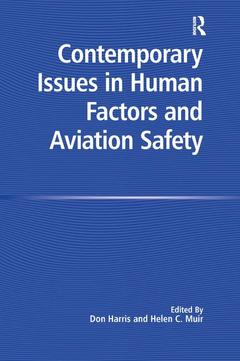Description
Contemporary Issues in Human Factors and Aviation Safety
Author: Muir Helen C.
Coordinator: Harris Don
Language: English
Subject for Contemporary Issues in Human Factors and Aviation Safety:
Keywords
CRM Training; Federal Aviation Administration; situation; Non-technical Skills; awareness; UK Civil Aviation Authority; crew; CRM; resource; Situation Awareness; management; Human Factors Training; federal; Flight Progress Strips; administration; Error Management; flight; Human Factors Training Programmes; deck; ATC System; commercial; Paper Flight Progress Strips; Aviation Industry; Flight Crew; Flight Management System; Alerting System; Paper Flight Strips; Air Accidents Investigation Branch; Strip Marking; Future ATC System; Aviation Community; Attentional Capture; Flight Plan Information; CRM Skill
Approximative price 61.25 €
In Print (Delivery period: 14 days).
Add to cartPublication date: 09-2016
· 15.6x23.4 cm · Paperback
Approximative price 205.30 €
Subject to availability at the publisher.
Add to cartPublication date: 06-2005
342 p. · 15.6x23.4 cm
Description
/li>Contents
/li>Biography
/li>




